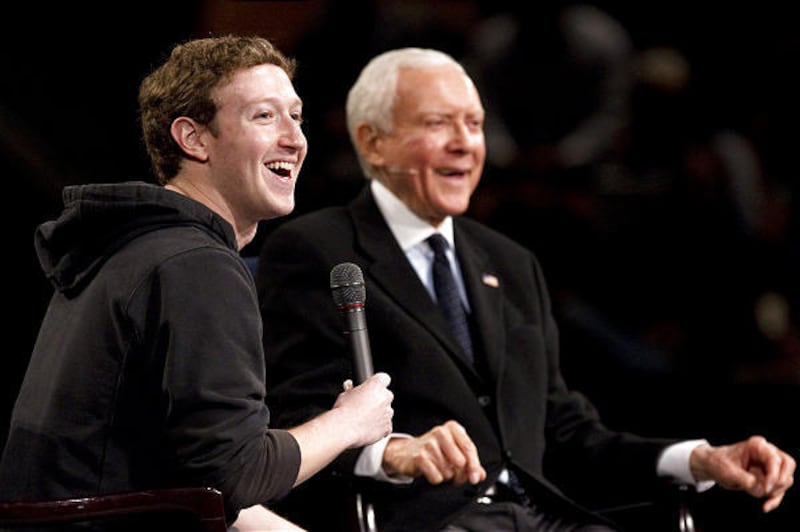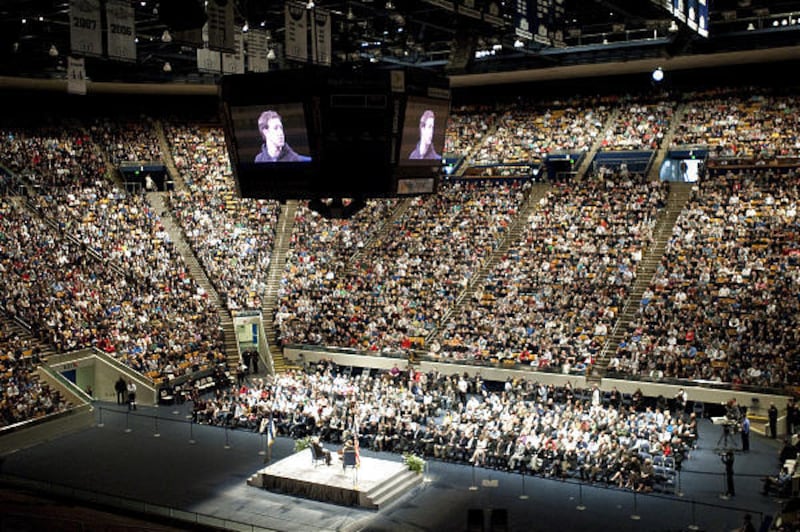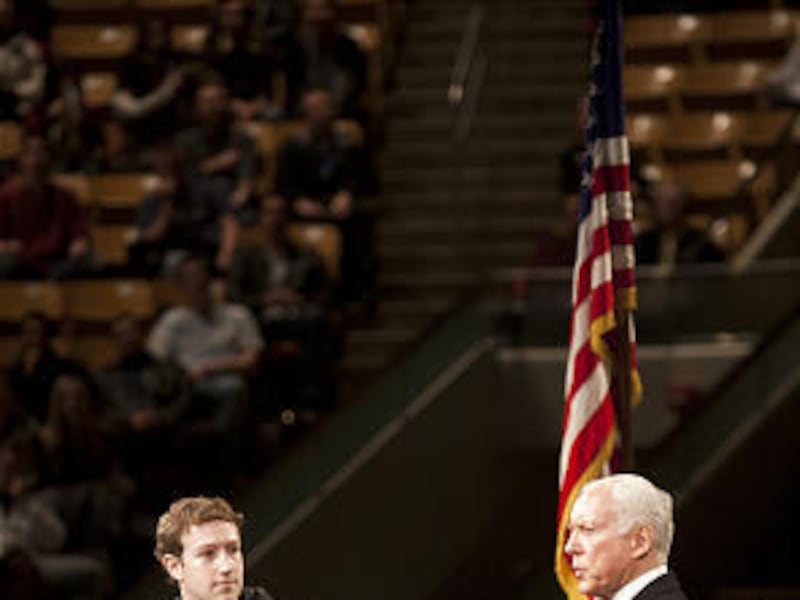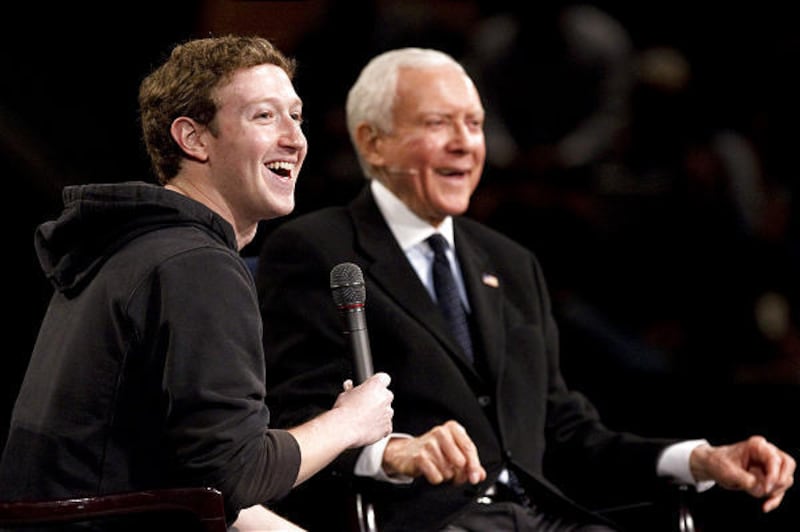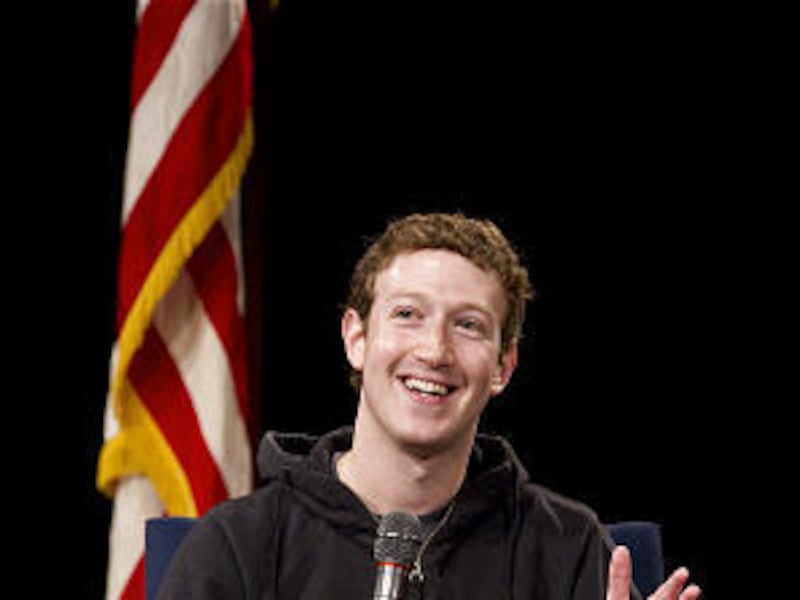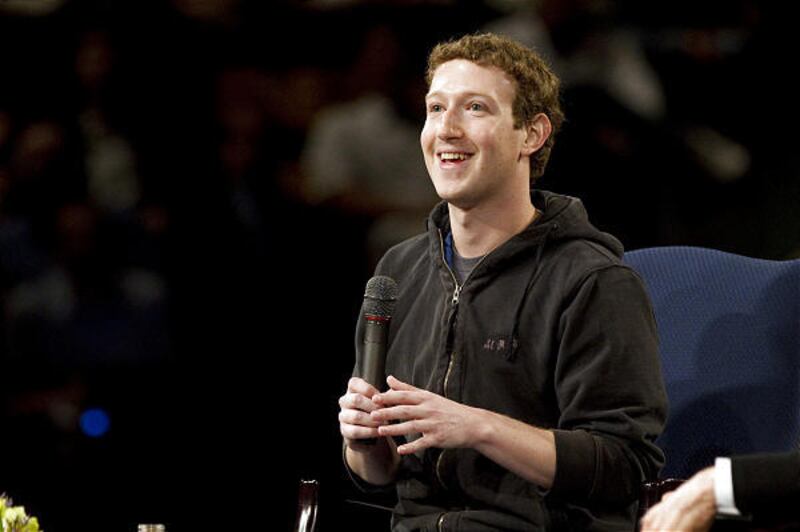PROVO — There's more than a good chance you've heard of Mark Zuckerberg.
An adaptation of his story was featured in the recent Oscar-winning film "The Social Network," in 2010 he was named Time magazine's "Person of the Year" and the project he spawned in his little Harvard dorm room less than a decade ago, Facebook, has reached 500 million people worldwide — and nearly half of all Americans.
Taking the stage in his first public forum appearance wearing his trademark hoodie and jeans in a somewhat unusual pairing with Utah's senior U.S. Sen. Orrin Hatch, the two sat on faux-cozy adjacent armchairs as Zuckerberg fielded questions about the future of social media technology, entrepreneurship and education submitted through — you guessed it — BYU's Facebook page.
"I have to say I'm a little bit nervous — I've never spoken to a stadium of people before," he said to the crowd of almost 10,700 filling the Marriott Center on Friday.
As chairman of the U.S. Senate Republican High Tech Task Force, Hatch asked Zuckerberg to come to BYU after hearing him speak on the international implications of technology.
"The main reason I invited him is to finally have him accept me as a [Facebook] friend," Hatch joked as the forum began.
Reported to be worth $13.5 billion, Zuckerberg discussed the evolution of his social networking giant and how having a small team of passionate workers makes all the difference in serving half of a billion users.
"One thing that gets blown out of proportion is the emphasis on the individual," he said. "The success of Facebook is really all about the team that we've built. In any company that's going to be true. One of the things that we've focused on is keeping the company as small as possible … Facebook only has around 2,000 people. How do you do that? You make sure that every person you add to your company is really great."
Zuckerberg discussed the humble and unexpected beginnings of the company, starting out as a simple product he created as a college sophomore in 2004. He was quite certain, in fact, that if that company "was ever going to be built from what we were doing, then someone much more qualified than me would do it."
Within a few weeks, however, two-thirds of the Harvard student body was using the site and it "kind of just got out of control from there."
Admittedly without much knowledge regarding running a company or making money, Zuckerberg said the company moved to Palo Alto, Calif., where he made important connections and learned about business.
Much of that education dictating how he personally approached building his social networking site — the largest in the world — came from his relatively short stint at Harvard, registered as a double major in computer science and psychology.
"All of these problems at the end of the day are human problems," he said. "I think that that's one of the core insights that we try to apply to developing Facebook. What [people are] really interested in is what's going on with the people they care about. It's all about giving people the tools and controls that they need to be comfortable sharing the information that they want. If you do that, you create a very valuable service. It's as much psychology and sociology as it is technology."
Rather then hindering education and students' ability to learn, Zuckerberg said he feels technology can help with "great resources" available online and through various platforms. Improving education is one of his long-term goals with Facebook, and the young CEO recently donated $100 million to Newark public schools in New Jersey — among the country's worst performing public school systems.
Despite all of the company's successes and a reserved, earnest Zuckerberg, the questions Hatch read carefully tiptoed around Facebook's past legal battles and somewhat murky history in its creation, made more controversial with the implications presented in this fall's opening of "The Social Network," a film based on Ben Mezrich's book, "The Accidental Billionaires."
Former Harvard students Cameron and Tyler Winklevoss along with Divya Narendra filed a lawsuit against Zuckerberg in 2004, accusing him of stealing their idea for a social networking site originally called HarvardConnection.com but later changed to ConnectU.
The case settled in 2008 and Facebook paid them $20 million in cash and over $1.2 million in shares.
Another criticism of Facebook Zuckerberg did address, however, is the common concern regarding privacy and oversharing of personal information in a public forum.
"If you go back 10 years, a lot of people were afraid of sharing things on the Internet," he said. "One of the things that initially got people comfortable is that we offer extremely robust privacy controls. A lot of folks now understand they know where their information is going. …We're really focused on safety, especially children's safety … We really try to build a safe environment."
Facebook is trying to maintain that sense of privacy by simplifying its privacy controls and continually creating new innovations that protect users' information, Zuckerberg said. Now, for example, if you log into your account from an unusual place, the site will ask you personal questions or show you pictures of friends that only the real user would recognize.
On a more positive, social scale, Zuckerberg said the implications of Facebook stretch beyond simple local interactions and into fostering understanding between countries. One of Facebook's engineers put together a website, peace.facebook.com, which tracks the online relationships between countries, including those that are historically at odds with one another.
As far as his advice to budding entrepreneurs goes, Zuckerberg foregoes technical prowess and recommends truly loving and believing in whatever you're doing since you'll inevitably encounter a lot of challenges along the way and it will become the seemingly "rational thing for you to stop" if you don't.
"Find that thing you're super passionate about," he said. "A lot of the founding principles of Facebook are that if people have access to more information and are more connected it will make the world better; people will have more understanding; more empathy. That's the guiding principle for me. On hard days, I really just step back and that's the thing that keeps me going."
Email: clarson@desnews.com

